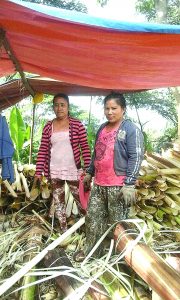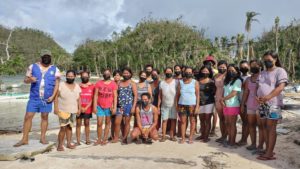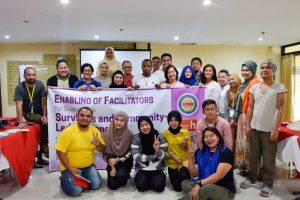Everyone is waiting for their food packs from the Barangay. It is a “lockdown”, as the people call it. In Barangay Rogongon, Iligan City, residents are told that they cannot go to other barangays, nor outsiders can enter theirs.
But when the ration came, there was an air of uncertainty. Some received two kilos of rice, some three, and in some areas, four kilos. There were some canned sardines and a pack of mongo beans.
Arlene Calijun, a mother of four, looked at the ration and wondered until when it was going to last. How can they survive now that her husband can no longer work in Iligan City because of the enhance community quarantine? They have no farm that could provide them with supplemental income. Her husband was one of the members of EcoWEB’s production guild thaft was commissioned to harvest abaca at NewTech Pulp in Baloi, Lanao del Norte. That was their only means of livelihood. Her husband could try finding menial work around but enhanced community quarantine in their barangay has made work almost impossible to find. Three of their four children–the youngest of them being 9 years old–still live with them. This is quite a big family for the three-kilo rice ration they have received.
During the implementation of the enhanced quarantine in Iligan City, EcoWEB made a quick survey in the barangays where they have projects to see how to help their beneficiaries cope with the abrupt change of situation. EcoWEB assessed the situation in Rogongon and decided to continue the harvesting on abaca farms in the barangay. This effort is through its FPG-SEEDIC project supported by Bread for the World. This project organizes farmers into production guilds that manage abaca production from nursery to harvesting and into trading. It is also crucial that the Philippine abaca industry would continue to supply the world market with abaca fiber as it is used in the manufacturing of medical gas masks and gowns. Other uses of the abaca fiber include hospital linens, bedsheets, micro-glass air filter media, x-ray negative, and vacuum filter. Continuing the harvesting in Rogongon is just a small contribution one can make in the present fight against this COVID-19 pandemic.
As EcoWEB assembled the production guild for this harvesting job, Arlene applied as a tuxy stripper per recommendation by her husband who already belongs to the guild. Together with a new woman member, she joined the team.
“I am very happy to have this job,” she proudly said. “If not for this quarantine, I cannot have this job,” she added with a laugh.
Now that she and her husband are now temporarily employed in the production guild, their income is now doubled.

Arlene (left) together with another woman member of the abaca production harvesters’ guild. (Photo by Jonathan Lozano)
“Not everything in this quarantine is bad after all, Arlene added. “It opens a new opportunity for us as wives to help our husbands earn for our family.”
For EcoWEB, the inclusion of women in the guild is not a coincidence. It is a deliberate effort to include them in their operational activities. The present guild that harvests abaca in Rogongon has three women – a little under the 40% women target that the project aims.
Arlene is now in charge of the tuxying and drying of the abaca fiber. To help her develop the skills she needs to become a permanent guild member, EcoWEB makes sure she receives formal training. On top of this, her husband has helped make the job easier for her by sharing tips. Now that she has her income, uncertainty over the situation and the length of the community quarantine period evade her as she focuses on this new opportunity for her and her family.



